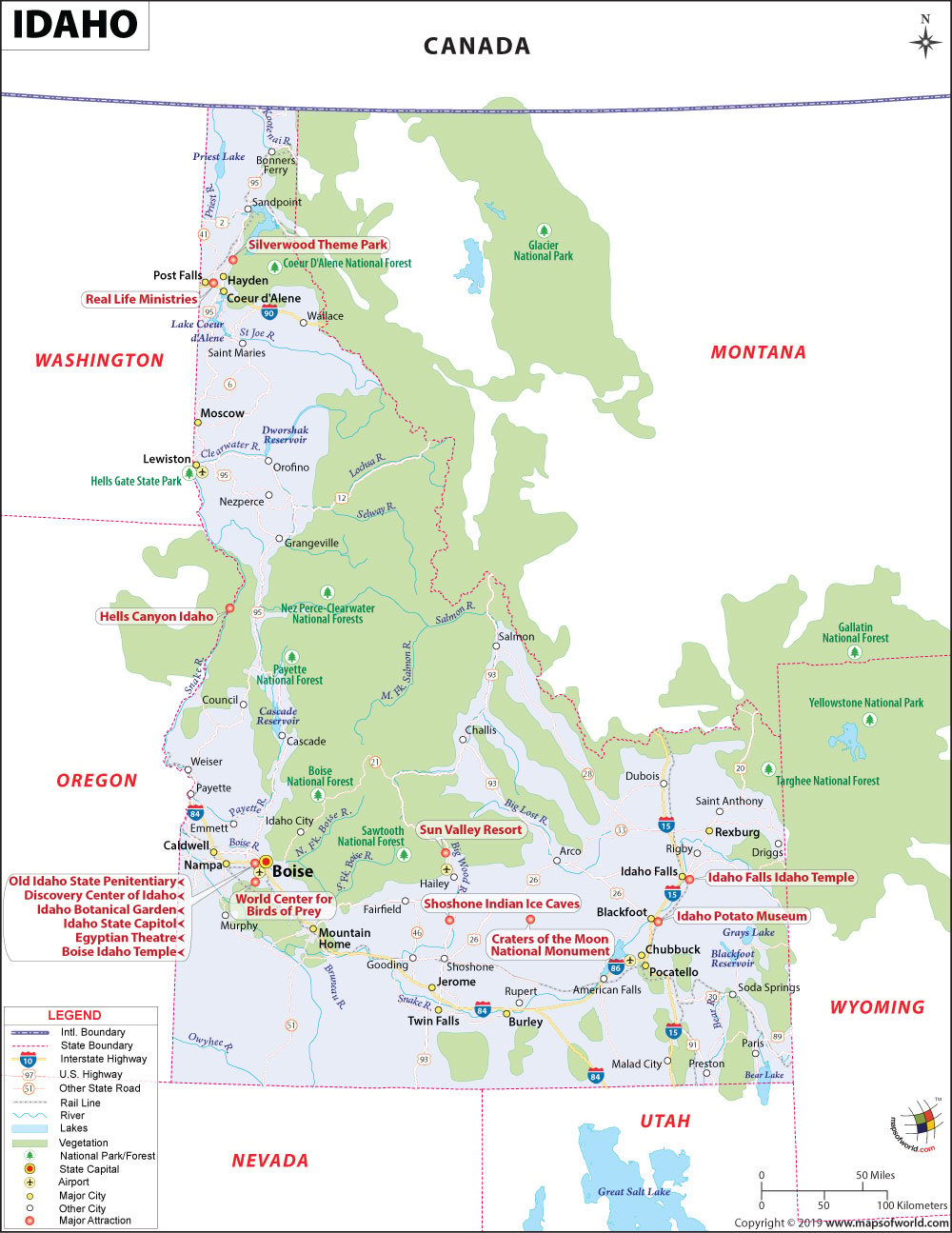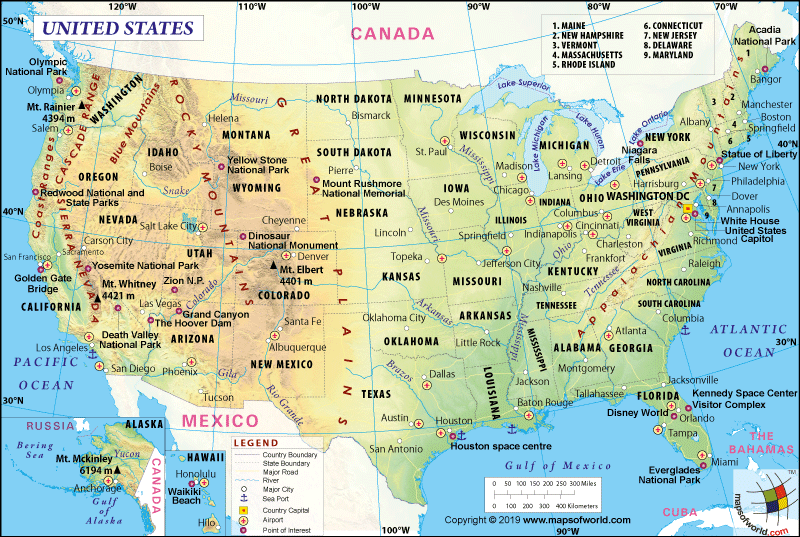What are the Key Facts of Idaho?

|
State |
Idaho |
|
State Capital |
Boise |
|
Largest City |
Boise |
|
Coordinates |
Coordinates: 45°N 114°W |
|
Nickname(s) |
Gem State |
|
Postal Abbreviation |
ID |
|
Area |
83,797 sq. mi (216,900 sq. mi) |
|
Highest Point |
Borah Peak, 12,662 ft (3,859 m) |
|
Neighboring States |
Washington, Oregon, Nevada, Utah, Montana, Wyoming |
|
Number of Counties |
44 |
|
Population |
1,754,208 (2018) |
|
Date of Entering the Union |
July 3, 1890 |
|
State Anthem |
“Here We Have Idaho” |
|
Governor |
Brad Little (Republican) |
|
Lieutenant Governor |
Janice McGeachin (Republican) |
|
U.S. Senators |
Mike Crapo (Republican), Jim Risch (Republican) |
|
U.S. House Delegation |
Russ Fulcher (Republican, 1st district), Rep. Mike Simpson (Republican, 2nd distSenator Mike Crapo (Republican), Senator Jim Risch (Republican), Rep.rict) |
|
GDP (Millions of Dollars) |
77,052 |
|
Demonym |
Idahoan |
|
Time Zones |
primary UTC−07:00 (Mountain), Summer (DST) UTC−06:00 (MDT); Idaho Panhandle UTC−08:00 (Pacific), Summer (DST) UTC−07:00 (PDT) |
Where is Idaho?
Idaho (the 43rd state to be included in the United States on July 3, 1890) is located in the Pacific Northwest region of the USA. It shares its border with Oregon to the west, Washington to the west, Utah to the south, Nevada to the south, Wyoming to the east, and Montana to the east and northeast.
What is the Geography of Idaho?
Idaho is spread across a total area of 83,797 sq. mi. (216,900 sq. km), making it the 12th largest state in the United States. While 87,471 sq. mi (214,500 sq. km) is land area, just 823 sq. mi (2,133 sq. km) is water area. Water bodies constitute around 1.1% of the total area. This state is 479 miles (771 km) long and 305 miles (491 km) wide.
Despite the relatively small percentage of water area, Idaho has the most river miles in the US. This state has more than 3,100 miles (4,989 km) of river miles. Some of the longest and scenic rivers of the state are Owyhee River, Lochsa River, Selway River, Boise River, Salmon River, Big Wood River, Clark Fork River, Jarbidge River, Coeur d’Alene River, Snake River, etc.
There are beautiful lakes in this “Gem State”, and some of the most famous ones are Lake Pend Oreille (Bonner and Kootenai counties), Bear Lake (Bear Lake County), Lake Coeur d’Alene (Kootenai and Benewah counties), Redfish Lake (Custer County), Priest Lake (Bonner County), Lake Cascade (Valley County), Stanley Lake (Custer County), Henrys Lake (Fremont County), Alice Lake (Blaine County), Sawtooth Lake (Custer County).
Idaho’s mean elevation is 5,000 ft (1,524 m) above sea level. While Borah Peak at 12,662 feet (3,859 m) above sea level is the highest elevation point, the Snake River (in the northwestern region of Idaho near Lewiston) at 710 feet (216 m) above sea level is the lowest elevation point. The significant mountains in this state are Borah Peak, Leatherman Peak, Mount Church, Diamond Peak, Mount Breitenbach, Lost River Peak, Mount Idaho, Donaldson Peak, Hyndman Peak, USGS Peak, etc.
There are three major landforms in Idaho: The Rocky Mountains, the Basin and Ridge Region, and the Columbia Plateau.
The largest area in this state is occupied by the Rocky Mountains, extending from the Idaho Panhandle in the south all along the border of Wyoming. This landform is characterized by deep canyons, steep gorges, rivers, and swift streams. There are around fifty mountain peaks (including the highest elevation) in this state (all located in this region) that are more than 10,000 ft (3,048 m) high.
In the Idaho Panhandle, the Bitterroot Mountain Range is located along the Montana border. The Continental Divide passes through the Bitterroots in this state. In the northern Panhandle, Coeur d’Alene Mountains is situated to the west of the Bitterroot Mountain Range. The Grizzly Mountain at 5, 950 ft (1,814 m) is the highest peak in the Coeur d’Alene Mountains.
While the Clearwater Mountains are located to the south of the Coeur d’Alene Mountains, the Salmon River Mountains are located to the south of the Clearwater Mountains. The Salmon River encircles the Salmon River Mountains entirely. The Bighorn Crags are found in these mountains.
The extremely rugged series of mountains named Sawtooth Mountains (having granite peaks, beautiful meadows, and alpine lakes) is located to the south of the Salmon River Mountains. There are 33 mountains in the Sawtooth Mountains whose peaks are more than 10,000 ft (3,048 m) high above sea level.
Along the Idaho-Oregon border, the Seven Devils Mountains rise. Both the Hells Canyon and the Snake River are located to the west of the Seven Devils Mountains. Hells Canyon is the deepest gorge in North America having a depth of more than 7,800 feet (2,377 m). It has a greater extent than that of Grand Canyon.
The Lost River Range, extending 70 miles or 113 km from northwest-to-southeast, is located in central Idaho. Borah Peak, the highest elevation point in the state, is located in this mountain range. The Lemhi Range that is around 100 miles (161 km) long from the Salmon River to the Snake River Plains and 10-15 miles (16-24) km wide runs in a southeasterly direction. The Diamond Peak is the highest in this range.
The Blackfoot Mountains, located in the further south, stretches from the northwest-to-southeast of 50 miles or 80 km from Idaho Falls to Soda Springs. The highest peak in this range is the Blackfoot Peak at 7,404 ft (2,257 m).
The second most prominent landform is the Columbia Plateau, which enters this state from Washington at the base of the Idaho Panhandle. Across southern Idaho, it follows the Snake River. The Snake River Plain, spread across a width of 20-40 miles (32-64 km), is made up of lava flows. This plain is best for growing crops such as sugar beets and potatoes.
The third most important landform includes basin and range region in southern Idaho. Grassy plateaus, as well as mountainous section’s deep valleys, are the characteristic features of this landform.
What is the Climate of Idaho?
This state has a diverse climate. The Pacific weather pattern’s influence helps in moderating the temperature extremes. Northern parts of this state receive more rainfall than that of southwestern and southeastern Idaho.
The summer season is warmer in southern Idaho than the northern one. In fact, throughout the year, the southern parts remain drier than the north. The south part of the state is cooler than the western region and drier than the northern part.
Hurricanes don’t happen in Idaho. Tornadoes too hardly occur. Cold fronts, as well as thunderstorms, accompany the winds. However, the damage caused by hail is minimal in Idaho than the other states located in the central USA.
The average monthly temperature ranges within the high at 90.6 °F (32.6 °C) and low at 15.1 °F (-9.4 °C). The highest and lowest temperatures recorded in Idaho are 118 °F or 47.8 °C (recorded at Orofino on July 28, 1934) and -60 °F or -51 °C (recorded at Island Park Dam on January 16, 1943) respectively.
What is the Economy of Idaho?
The total Gross Domestic Product for Idaho has increased from US$55,546 million in 2008 to US$77,052 million in 2018. The state’s Median Household Income has increased from US$47,420 in 2008 to US$58,728 in 2018. The Per Capita, Personal Income in Idaho, has grown from US$32,722 in 2008 to US$43,901 in 2018.
The rate of unemployment has come down drastically from the peak at 9.6% in July 2009 to 2.9% in November 2018. Idaho is an important agricultural state, which produces around 1/3rd of the potatoes grown in the US. Major industries of the state are food processing, tourism, silver and other mineral mining, manufacturing of electronics, paper products, chemical products, machinery, and lumber/wood products.
In 2018, the total value of exports and imports were US$4,021,659,326 and US$6,882,393,884 respectively, resulting in a trade balance of -US$2,860,734,558. The major exports are Electrical Machinery, Industrial Machinery, Dairy Products, Precision Instruments, Photographic Materials, Vegetables, Oil Seeds, etc. The major imports are Industrial Machinery, Electrical Machinery, Wood, Oil and Mineral Fuels, Precision Instruments, Preserved Fruits and Vegetables, Plastics, Animal Feeds, Motor Vehicles and Parts, etc.
The number of people living below the poverty line in this state in 2018 was 216,309, out of a population of 1,686,491. The poverty rate was 12.8% in 2018.
What is the Transportation System of Idaho?
Idaho Transportation Department, the governmental transport organization in the state of Idaho, oversees and manages over 12,200 miles (19,600 km) of roadways, over 1,800 bridges, around 1,630 miles (2,620 km) of railway tracks, 126 airports, and the Port of Lewiston. Twenty-nine rest areas and twelve ports of entry also come under the responsibility of the Idaho Transportation Department.
The major airports in the state are Boise Airport (in Boise), Idaho Falls Regional Airport (in Idaho Falls), Lewiston-Nez Perce County Airport (in Lewiston), Pocatello Regional Airport (in Pocatello), Friedman Memorial Airport (in Sun Valley), Magic Valley Regional Airport (in Twin Falls), and many more.
Why is Idaho called the “The Gem State”?
The mining lobbyist George M. Willing first coined the word “Gem of the Mountains” for the new territory around Pike’s Peak in the Congress at the end of 1860. The nickname “The Gem State” developed from this concept and the name coined by George M. Willing.
This state is endowed with abundant natural resources and scenic beauty, including vast lakes, snow-capped mountains, steep canyons, and rapids. The nickname originated from the fact that the mountains of Idaho are the hotbeds of all kinds of minerals including gold, silver, copper, cobalt, zinc, lead, and other rare metals.
What are the Popular Tourist Attractions in Idaho?
Sun Valley, Shoshone Falls, Hell’s Canyon National Recreation Area, Sawtooth National Recreation Area, Lake Coeur d’Alene, Craters of the Moon National Monument, Boise River Greenbelt, City of Rocks National Reserve, Old Idaho Penitentiary State Historic Site.
Facts About Idaho
1) Idaho was admitted to the Union on July 3, 1890.
2) The capital and biggest city of Idaho is Boise.
3) The river canyon with the maximum depth in the Northern U.S. is the Hell’s Canyon.
4) Wallace is the hometown of Lana Turner, the famous Hollywood star of the yesteryears.
5) Idaho is nicknamed the Gem State because of its gemstone resources.
6) The official flower of the state is Lewis Mock Orange or Syringa.
7) The official tree is the Western White Pine.
8) The official fish is the Cutthroat Trout.
9) The official bird is the Mountain Bluebird.
10) The tallest point of Idaho is Mt. Borah. The elevation is 12,662 feet.
11) The official mammal is The Appaloosa.
12) Important industries of Idaho include healthcare, travel and tourism, processed food, manufacturing, cultivation, and mining.
13) The oldest construction in Idaho is the Cataldo Mission.
14) The Eastern Idaho State Fair is held at Blackfoot.
15) The state anthem is “Here We Have Idaho”.
16) The official bug is the Monarch Butterfly.
17) Idaho is famous for people like Ernest Hemingway, Mariel Hemingway, Harmon Killebrew, and Lana Turner.
18) The state is rich in natural resources like gold, copper, silver, lead, wood, and zinc.
19) The official fossil is the Hagerman Horse.
20) The official gemstone is the Star garnet.
Maps Related to Idaho



